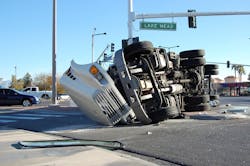ATRI report: More trucks in traffic, more accidents after 2013 restart changes
Intuitively and anecdotally, many in the trucking industry have argued the 2013 restart changes in the hours of service rule put more trucks on the road during peak morning traffic periods. Now there’s statistical evidence to back up the assertion.
The American Transportation Research Institute (ATRI) on Wednesday released the results of its new analysis of the safety and operational impacts from the 34-hour restart provisions.
In this latest of an ongoing series of Research Tech Memos, ATRI analyzed an extensive truck GPS database to identify changes in truck travel by time-of-day and day of the week that may have occurred after the July 1, 2013 change to the Hours-of-Service (HOS) restart provisions. ATRI also examined several years of pre- and post-July 1 federal truck crash data to quantify safety impacts resulting from the HOS rules change implemented by the Federal Motor Carrier Safety Administration.
“After many years of crash decreases, everyone knows our industry has experienced an uptick in crashes,” said Dean Newell, vice president, safety of Maverick USA Inc. and a member of ATRI’s Research Advisory Committee. “This latest analysis from ATRI validates both changes in operations and crash risk that seems to be associated with the restart rule. Regulations should serve to improve safety, not create additional safety risks.”
The truck GPS data analysis identified a shift of truck traffic from nighttime to daytime and a shift of truck traffic away from the weekends to more congested weekdays, with the biggest decreases in truck activity occurring on Sunday nights.
The crash data analysis also showed a statistically significant increase in truck crashes after the July 1, 2013 rule change, specifically with injury and towaway crashes. In particular, the increase in injury and towaway crashes would be expected based on the shifting of trucks to more congested weekday travel due to increased traffic exposure, ATRI notes.
The crash increases and operational shifts would ostensibly be independent of overall economic improvement since the statistical tool utilizes percentage change, and tonnage growth percentages over the 2-year period were relatively constant. In addition, truck unit position points are a better indicator of physical truck movements than freight volumes, the researchers say.
ATRI’s report features some possible explanations for the GPS and crash data findings as a result of operational changes the industry had to make post-July 1, 2013. Among these are:
- Drivers abandoning use of the more restrictive 34-hour restart in favor of the rolling recap.
- Expanded use of weekend productivity by drivers, particularly Friday into early Saturday driving.
- Earlier weekend dispatches for drivers to avoid disruptions to early week (Monday-Tuesday) operations.
The technical memorandum may be downloaded here.

